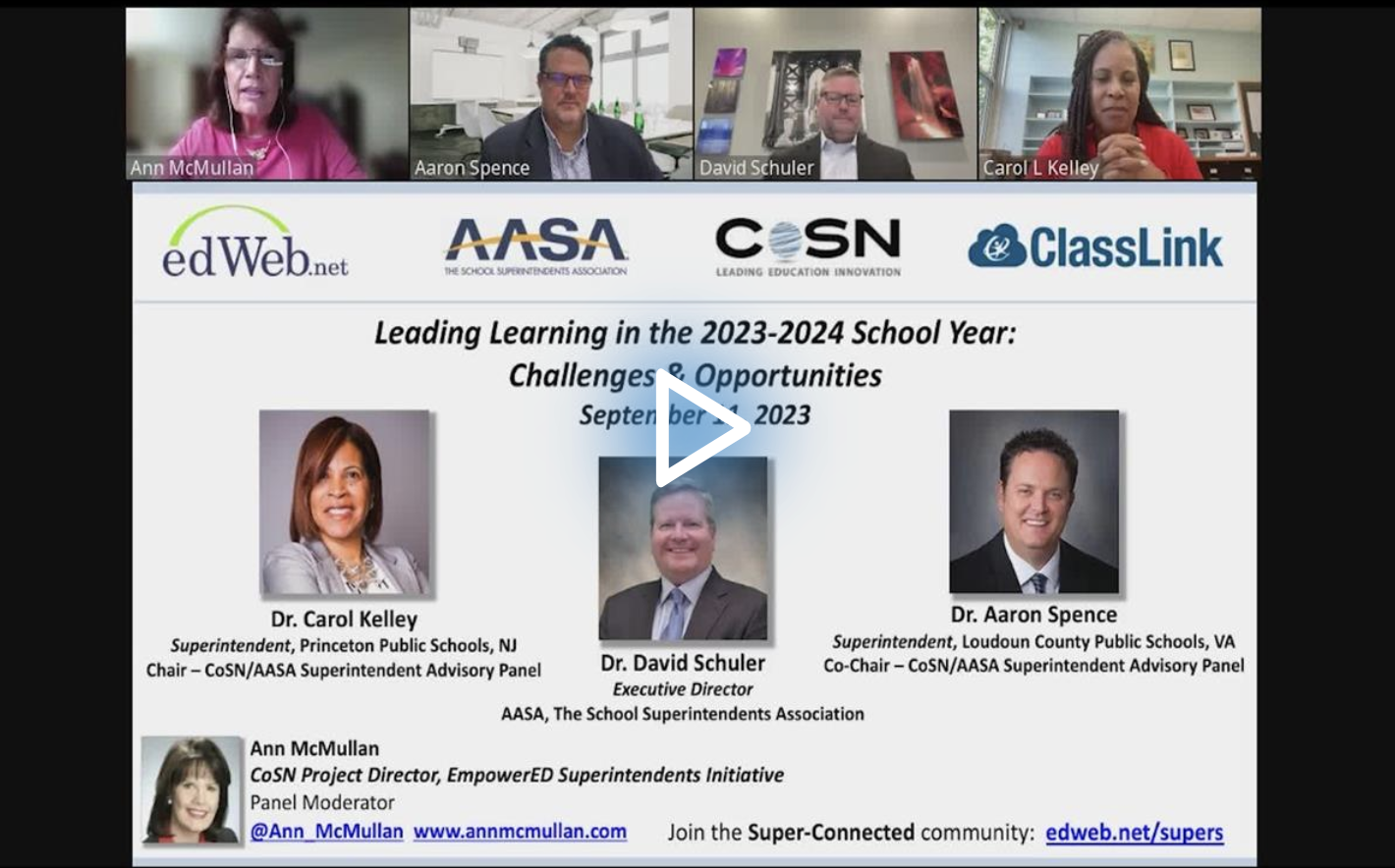5 Challenges and Opportunities for the 2023-24 School Year
Watch the RecordingListen to the Podcast
This edLeader Panel is presented by CoSN and AASA.
Sponsored by ClassLink
Each school year brings new challenges, but the key for school leaders is to convert these challenges into positive opportunities. During the edLeader Panel “Leading Learning in the 2023-2024 School Year: Challenges and Opportunities,” two superintendents who serve as the Chair and Co-Chair of the CoSN/AASA EmpowerED Superintendents Advisory Panel, along with the Executive Director of AASA, The School Superintendents Association, identified five areas of concern for this year and how they are addressing them.
1. AI and ChatGPT
Of course, the first reaction to this new iteration of the technology was about students cheating. However, the panelists reminded viewers that AI has been around for a long time, such as autocorrect when typing. Instead, they are trying to focus the conversations around pedagogy, instruction, and assessment. Rather than thinking about the harm the tool can do, for instance, they are looking at how it changes the way they present information or how they assess student progress.
Dr. Carol Kelley, Superintendent of Schools at Princeton Public Schools (NJ), said instruction needs to focus on the process so students demonstrate what they are thinking and how they approach their work. In addition, teachers could look at how using AI might assist them with the administrative side of their work. All panelists agreed this will be a long, complex conversation.
2. Sustainability of programs funded by special resources during prior school years
During the pandemic, the federal government allocated additional funding for K-12 schools that is now going away. Since school leaders knew the additional funding was temporary, most districts used the money for one-off expenditures. However, that doesn’t mean that those programs should go away.
Dr. Aaron Spence, Superintendent of Loudoun County Public Schools (VA), advised viewers to examine what strategies were effective, and if they haven’t already, make them part of the operating budget. For example, many schools used the funding to develop intensive tutoring programs that continue to help accelerate student learning.
3. Finding success in providing new learning opportunities for all
During the pandemic, school leaders had to get creative to help both teachers and students achieve success. But more importantly, it spurred them to design learning experiences for the new world the students will face when they enter the workforce.
Educators should continue to connect learning and coursework to the real world. In addition, all of the panelists advocated for keeping SEL initiatives that have proven to be an invaluable part of the school day.
4. Addressing digital equity
As emphasized by Dr. David R. Schuler, Executive Director of AASA, The School Superintendents Association, digital equity isn’t just about access to a device but about being able to use it and all of the necessary tools. This could mean getting creative about providing Wi-Fi, like districts that use school buses to do so, or having specific curricula on digital citizenship.
Moreover, the panelists discussed thinking about what technology is really necessary for the learning process. Educators need to pay attention to how the devices and tools enhance or detract from a child’s ability to learn. Finally, Dr. Spence said that this should be a community and national conversation and that having access to the tools needed for work and school should be a public responsibility.
5. Assuring safe and secure online access for all
While schools and districts are working to increase safety and security and have made progress, they don’t have the expertise or resources that the tech companies have. Similar to digital equity, Dr. Schuler stated that schools should not bear the weight of safety and security, but rather the companies should step up and create a safer online experience.
Learn more about this edWeb broadcast, “Leading Learning in the 2023-2024 School Year: Challenges and Opportunities,” presented by CoSN and AASA and sponsored by ClassLink.
Watch the RecordingListen to the Podcast
Join the Community
Super-Connected is a free professional learning community for school superintendents, district leadership, and aspiring district leaders.


ClassLink is a global education provider of identity and analytics products that create more time for learning and help schools better understand digital engagement. As leading advocates for open data standards, we offer instant access to apps and files with single sign-on, streamline class rostering, automate account provisioning, and provide actionable analytics. ClassLink empowers 19 million students and staff in over 2,500 school systems. Visit classlink.com to learn more.
Blog post by Stacey Pusey, based on this edLeader Panel.






Comments are closed.